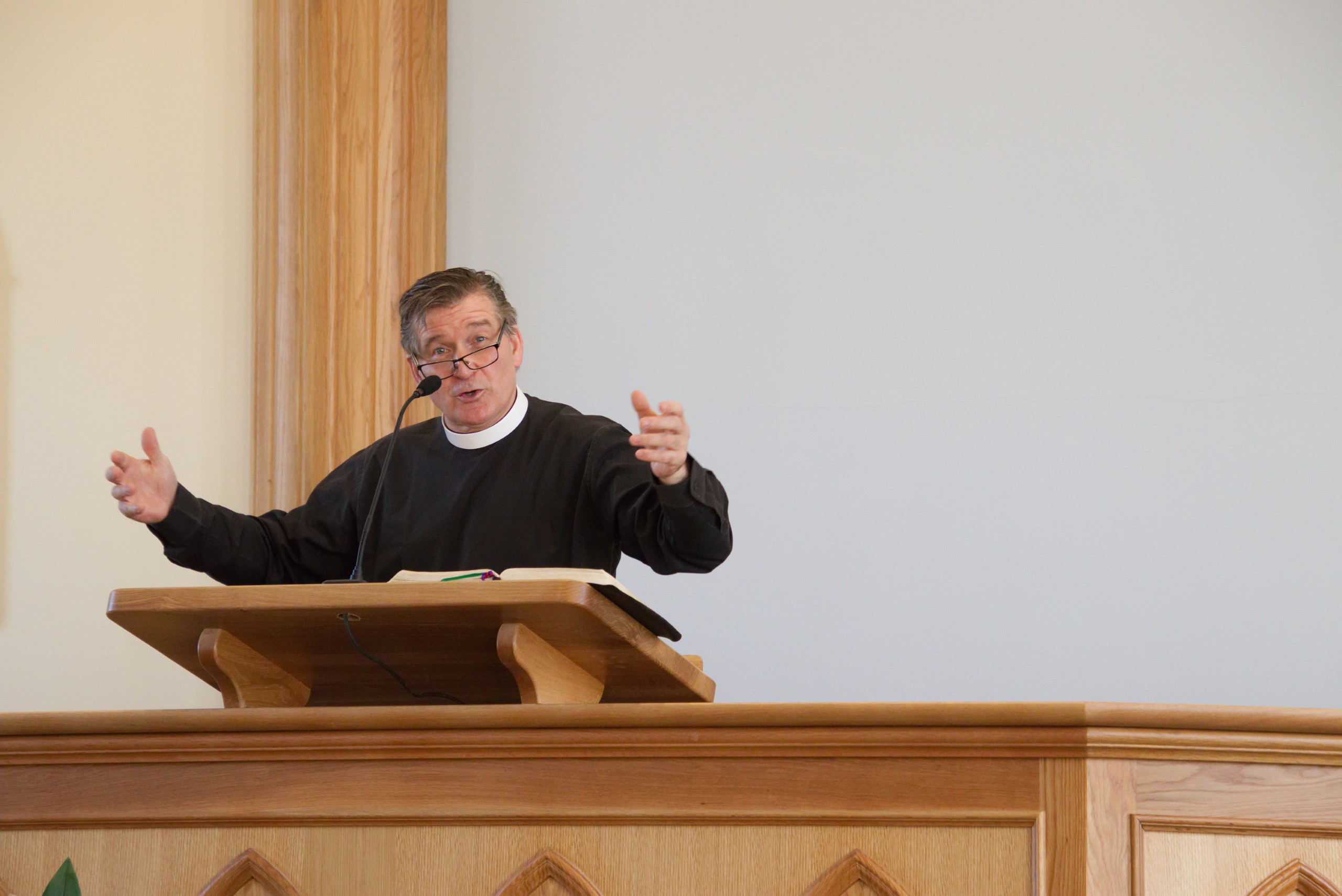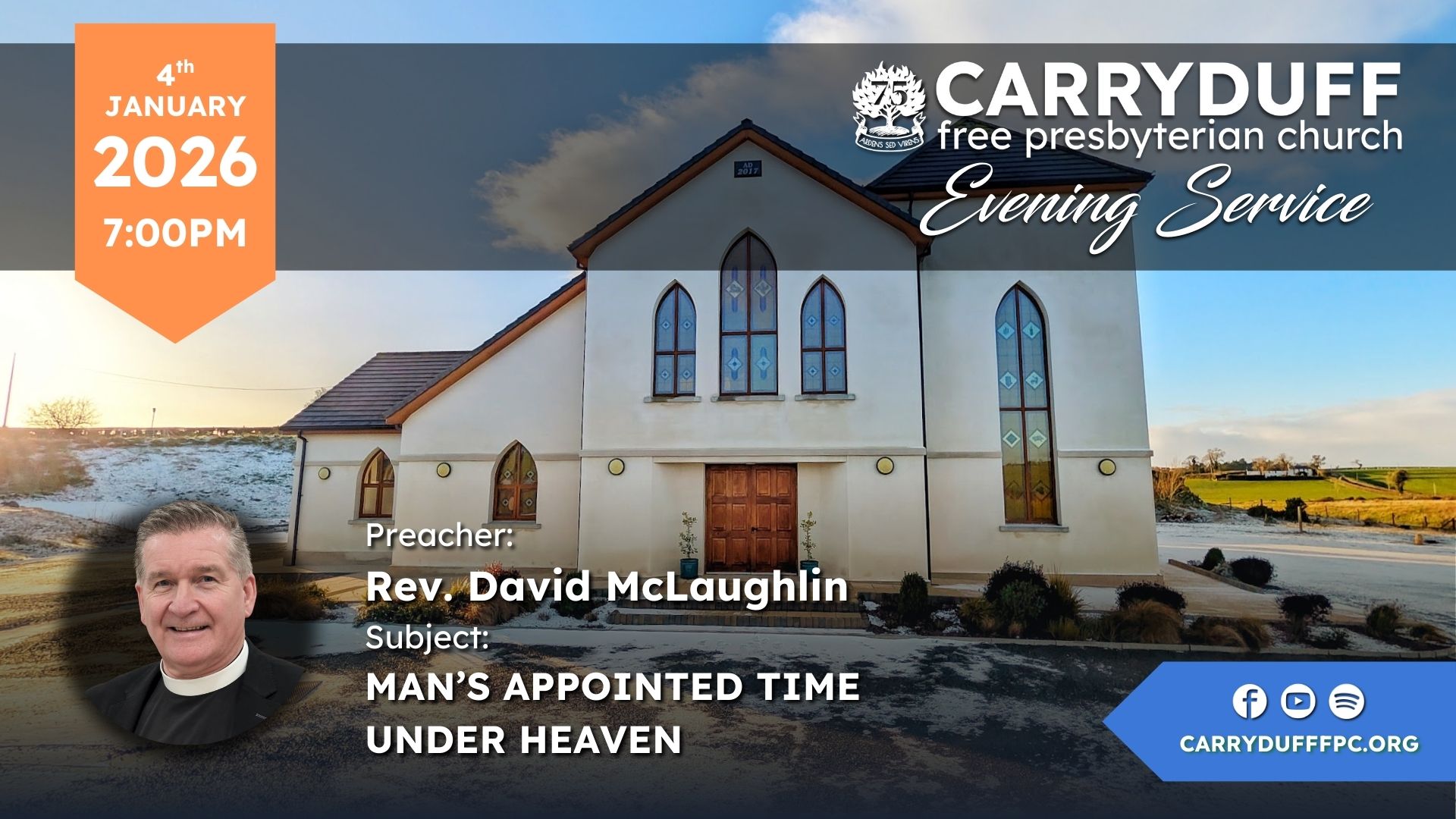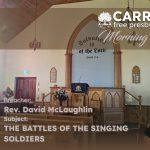Date: SUN 7:00 PM 22nd June 2025
Preacher: Rev. David McLaughlin
Bible Reference: Psalms 49:5
Wherefore should I fear in the days of evil,
when the iniquity of my heels shall compass me about?
Sermon Summary: Psalm 49 – “Are You Dogged by Iniquity?”
Text: Psalm 49, with a focus on verse 5: “Wherefore should I fear in the days of evil, when the iniquity of my heels shall compass me about?”
Overview: The sermon, delivered from Psalm 49, is a wisdom Psalm that addresses the futility of living for worldly riches, status, and fame in light of the certainty of death and the reality of God’s eternity. The preacher emphasizes the contrast between the ungodly, who live for the present and material wealth, and the godly, who live in a covenant relationship with God, focusing on redemption and eternity. The central question posed is, “Are you dogged by iniquity?”—referring to the persistent, personal sins that hinder one’s spiritual walk. The sermon is structured around the Psalm’s four parts: the call, the counsel, the comparison, and the conclusion, with a deep dive into the meaning of verse 5.
Key Points from the Sermon:
1. Context and Structure of Psalm 49:
- The Call (verses 1–4): The psalmist calls all people—regardless of culture, class, or creed—to hear and heed the wisdom and instruction of the Psalm. It is a universal message about life, death, and eternity.
- The Counsel (verses 5–12): The psalmist advises against envying those who trust in wealth, as riches cannot redeem a soul or provide escape from death.
- The Comparison (verses 13–15): A contrast is drawn between the godly and ungodly. The ungodly live for the moment, trusting in wealth, while the godly focus on redemption and a relationship with God, knowing they will stand before Him one day.
- The Conclusion (verses 16–20): The psalmist concludes that one should not fear when others grow rich, as death levels all, and wealth cannot be taken into eternity. The godly find hope in God’s redemption, while the ungodly face death without peace.
2. Central Theme: “Are You Dogged by Iniquity?” (Verse 5):
- The preacher highlights verse 5, interpreting “the iniquity of my heels” as a reference to personal, particular sins that persistently “dog” the believer’s footsteps, much like a small dog biting at one’s heels.
- Interpretations Considered:
- Some scholars suggest it refers to evil times or bad situations that trouble the godly.
- Others propose it refers to iniquitous men (adversaries) or even the devil (recalling Genesis 3:15, where the serpent bruises the heel).
- The preacher, however, argues that the literal meaning points to personal sins—specific, private, or “pet” sins that rise up to weaken one’s walk with God.
- Illustration: The preacher shares a personal anecdote about a dog attacking him during outreach, likening it to how sins persistently nip at the believer, causing spiritual stumbling.
3. The Picture Presented:
- The phrase “iniquity of my heels” paints a vivid image of sins as relentless pursuers, striking at the believer’s heels to trip them up on their spiritual pilgrimage.
- The preacher emphasizes that these are not abstract sins but specific, personal sins that haunt the individual, such as unconfessed or unrepented sins from the past.
- Scriptural Support:
- Solomon’s statement in Ecclesiastes: “There is no man that liveth and sinneth not.”
- Mark 7:21–23 lists sins (e.g., evil thoughts, adulteries, pride) that come from the heart, defiling a person.
- Revelation 21:8 warns of the fate of sinners (e.g., the fearful, unbelieving, liars) in the lake of fire.
- Application to All:
- Sinners: Unconverted individuals are in danger, as sin dogs their steps, leading them toward eternal judgment in hell if they remain unredeemed.
- Backsliders: Past sins, even those forgotten, can resurface to haunt the conscience, as illustrated by Joseph’s brothers in Genesis 42:21–22, who were confronted with guilt over their sin against Joseph after 22–23 years.
- Those Nearing Death: On the deathbed, unconfessed sins or rejected opportunities to trust Christ can rob a person of peace.
4. The Performance is Poetic:
- The imagery of “iniquity of my heels” is poetic, evoking the idea of sin as a persistent force, like a dog or serpent biting at one’s heels, causing bitterness and annoyance.
- Total Depravity: The preacher affirms the doctrine of total depravity, stating that every person is born in sin, dead in trespasses, darkened in mind, and diseased in affections (unable to love God or others perfectly).
- Common Grace: While not all commit every sin (e.g., murder, adultery), God’s common grace restrains people from falling into the depths of sin, though their hearts remain deceitful and wicked (Jeremiah 17:9).
5. The Power and Pollution of Sin:
- Sin is powerful and polluting, and no amount of wealth, works, or human effort can remove its guilt or consequences.
- Verse 7: “None of them can by any means redeem his brother, nor give to God a ransom for him.”
- Verse 8: “For the redemption of their soul is precious, and it ceaseth for ever.”
- Only redemption through the shed blood of Jesus Christ can address sin’s power, pollution, and poison, freeing a person from condemnation and translating them into God’s kingdom of light.
6. The Peace of the Pardon:
- The godly person, redeemed by Christ’s blood, need not fear the “days of evil” or the “iniquity of my heels” because they are accepted in Christ (Ephesians 1:6).
- Verse 15: “But God will redeem my soul from the power of the grave: for he shall receive me.”
- Redemption provides:
- Freedom from sin’s guilt and power.
- A new standing with God, moving from condemnation to commendation (“Well done, good and faithful servant”).
- Assurance of eternal life, as expressed in Psalm 23:6: “Surely goodness and mercy shall follow me all the days of my life: and I will dwell in the house of the Lord for ever.”
- Illustration: The preacher recounts Martin Luther’s response to the devil’s accusations in a dream, where Luther declared that the blood of Jesus Christ cleanses from all sin (1 John 1:7), allowing him to sleep peacefully.
7. Practical Exhortations:
- For the Unredeemed:
- Do not live for riches, which are fleeting and cannot redeem the soul.
- Seek redemption through Christ, not fame or wealth, but the favor of God and His wisdom.
- For the Redeemed:
- Recognize that even believers are not perfect, but they are accepted in Christ and cleansed by His blood.
- Trust in Christ’s atonement to overcome the haunting power of personal sins.
- For All:
- Reflect on your attitude toward God, the gospel, sin, and eternity.
- If “dogged by iniquity,” plead the blood of Christ for forgiveness and peace.
- Live in light of eternity, not for the temporary pleasures of wealth or fame.
8. Closing Challenge:
- The preacher urges the congregation to examine their lives:
- Are you living for the frivolity of riches or the reality of redemption?
- Do you have peace with God through justification by faith (Romans 5:1)?
- Are you trusting in Christ’s blood to cleanse you from all sin?
- Quoting Isaiah 26:3, the preacher reminds the audience that God keeps those in perfect peace whose minds are stayed on Him.
- The sermon concludes with a call to aim for redemption, God’s favor, and His wisdom rather than worldly pursuits, ensuring victory over sin and peace in the face of death.
Key Theological Themes:
- Futility of Wealth: Riches cannot redeem the soul or provide eternal security.
- Reality of Sin: Personal sins persistently haunt and endanger both the saved and unsaved, requiring redemption through Christ’s blood.
- Redemption: Only the shed blood of Jesus Christ can cleanse from sin’s power and pollution, offering peace and eternal life.
- Eternity: The godly live with eternity in view, trusting in God’s redemption, while the ungodly face death without hope.
- Peace through Pardon: Faith in Christ’s atonement provides freedom from fear and assurance of God’s acceptance.
Tone and Delivery:
- The sermon is earnest, pastoral, and evangelistic, blending scriptural exposition with practical application.
- The preacher uses vivid imagery (e.g., dogs biting at heels) and personal anecdotes to make the message relatable.
- The tone is urgent, particularly when addressing the unconverted and backsliders, but also hopeful, emphasizing the power of Christ’s redemption.
Conclusion:
The sermon on Psalm 49 challenges listeners to confront the persistent presence of personal sin (“the iniquity of my heels”) and to seek redemption through Christ rather than trusting in wealth or worldly pursuits. By focusing on the godly person’s hope in redemption and the peace of God’s pardon, the preacher encourages a life lived in light of eternity, free from the fear of death or sin’s haunting power. The final call is to trust in Christ’s blood, aim for God’s favor and wisdom, and find peace in His redemptive work.
Subscribe to the podcast here:
Spotify Podcasts | Apple Podcasts | Pocket Casts
Email | RSS | more information here








